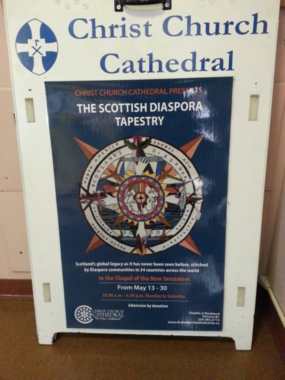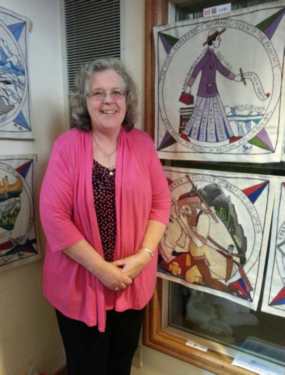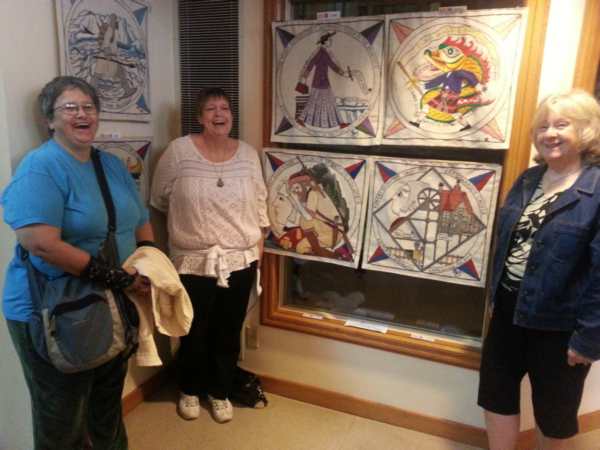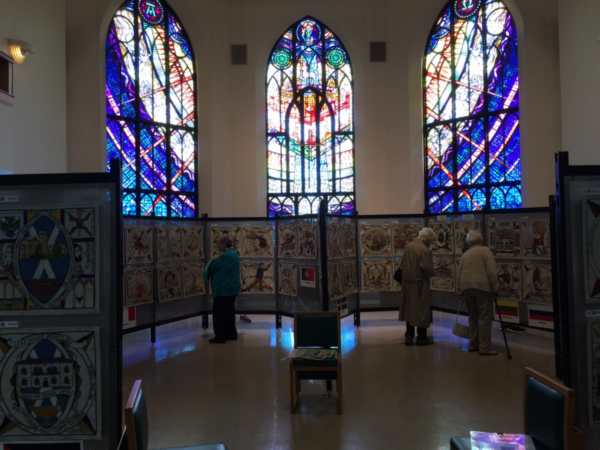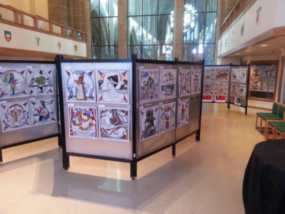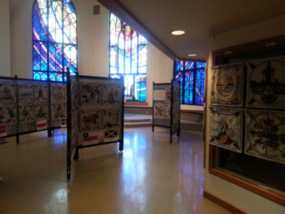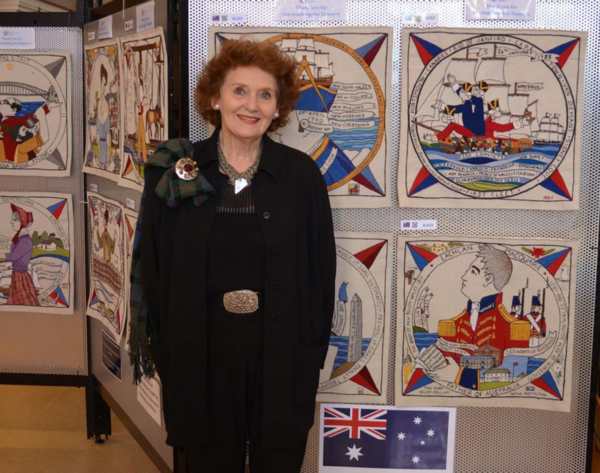The Tapestry has made its much anticipated landfall in Canada, where it visits Victoria in British Columbia [formerly New Caledonia!]
The magnificent setting of Christ Church Cathedral Victoria provides the opening exhibition of the seven stop tour in North America for the Scottish Diaspora Tapestry. Standing proudly by is Victoria stitcher Catriona Kaufman who, with fellow members of the Victoria Embroidery Guild, helped create Panel CA30 [top left image] depicting Agnes Dean Cameron*. The picture below shows two more members of the Victoria Guild, Marie Bourgeois and Johanna Lisakowski, who worked with Catriona on CA30 and the third, Lois Waters, who helped create CA33 [bottom right image] commemorating Coal Baron Robert Dunsmuir**.
It is being displayed in the Chapel of the New Jerusalem at the cathedral, using aluminium foil boards for the first time with some intriguing acoustic implications.
It moves to Winnipeg in June, including Canada Day there, and then briefly to the US in Marquette County before returning across the Border to Scarborough/ Toronto, Charlottetown Prince Edward Island, New Glasgow Nova Scotia and finally for St Andrew’s day Montreal in Quebec. At each location, stitchers who helped create this extraordinary artwork in 2012/ 2014 will be on hand to help with staffing/ guiding and sharing the whole world’s contributions with family and friends. Also in support is David Maclean, Baron of Prestonpans, who is Professor of Medicine at the University of British Columbia at Vancouver.
P.S. Although Jenny Bruce, Tour Director, is seen above standing next to the Australian flag and panels, she is very much on the ground in Victoria BC. She flies home to Scotland early June and returns to take charge again in Scarborough/ Toronto in September.
________________________________________________________________
* CA30 Agnes Dean Cameron
Stitchers: Pat Davis, Bonnie-Lynne Ceriko, Kilmeny Jones, Janice Clarke, Catriona Kaufman, Sharon MacDonald, JoAnn Allan, Marie Bourgeois, Barbara Gilbert, Johanna Lisakowski (Victoria, BC)
Educator, writer, lecturer, and adventurer, Agnes Deans Cameron was born in Victoria, British Columbia, in 1863, to Scottish parents. She graduated from Victoria High School and began teaching school in Victoria at age 16. During a long career in Victoria, Comox and Vancouver, she was BC’s first female high school teacher (1890) and first female principal (1894). At the same time she pursued a part-time career as a journalist. When her teaching career ended in 1906, she supported herself through writing. In 1908 she travelled down the Mackenzie River to the Arctic chronicling the trip in her book The New North. In 1910 she did a lecture tour of Britain to promote emigration to Canada. She died in 1912, one of the most famous writers in the country.
Agnes Deans Chamshron B’ e boireannach neo-eisimeileach a bh’ ann an Agnes Deans Chamshron le inntinn gun choimeas. B’ i a’ chiad bhoireannach a bha na rianadair air sgoil cho-oideachail ann am British Columbia agus stèidhich i Institiùd Luchdteagaisg British Columbia. Ann an 1906, fhuair i na ceannsuidhe air Comann Oideachail na h-Uachdranachd. Bha a’ Bh-uas Chamshron a’ cur taic ri mòran chùisean a’ gabhail asteach còraichean-bhòtaidh bhoireannach, Aonadh Measarrachd Chrìosdail Bhoireannach, Comhairle Ionadail Mhnathan Bhioctòiria agus Comann Cobhair Chloinne. Nuair a sguir i a theagasg ann an 1906, chùm i taic rithe fhèin mar neach-naidheachd. Ann an 1908, b’ e a’ Bh-uas Chamshron agus a co-ogha na ciad bhoireannaich gheala a shiubhail sìos Abhainn MhicCoinnich, a’ clàradh a heuchdan anns an New North.
** CA33 Coal Baron Robert Dunsmuir
Stitchers: Barbara Gilbert, Sharon MacDonald, Diana Caleb, Bonnie-Lynne Ceriko, JoAnn Allan, Lois Waters, Karen Lehman, Pat Davis, Johanna Lisakowski (Victoria, BC)
The Hudson’s Bay Company began recruiting miners from Ayrshire, Scotland, to help develop a mine at Fort Rupert on northern Vancouver Island. The first contingent arrived at Fort Victoria aboard the Harpooner on June 1, 1849. They were the John Muir and John McGregor families from Kilmarnock. The next group was the Boyd Gilmour and Robert Dunsmuir families, also from Kilmarnock. The miners had signed a contract with the HBC for three to five years. All were transferred in 1852 from Fort Rupert when the new coal deposit was discovered at Nanaimo. Robert Dunsmuir renewed his contract with the HBC and in 1855 he and Edward Walker were granted the first free miners’ licenses. He then reopened a mine on Commercial Inlet, hired his own workers and sold the coal back to the HBC. A coal-prospecting trip in October 1869 changed his life forever; he found a seam of coal that would bring him riches beyond his dreams. With capital from friends in the navy, he formed his own company and began transporting coal to San Francisco.
When British Columbia entered Confederation of Canada in 1871, British Columbia was promised a railway on Vancouver Island. In anticipation of this, the BC government established a railway land reserve 20 miles in width along the east coast of the island. Dunsmuir formed the Esquimalt & Nanaimo Railway Company (E & N Railway) and petitioned the government to construct the railway. All the railway land reserve was transferred to Dunsmuir. His consortium also received $750,000 bonus to help with construction. Construction began in 1884 and the railway was completed from Victoria to Nanaimo in 1886. He was now the richest man in British Columbia. Craigdarroch Castle was built, named after the home of Annie Laurie, a song made famous by Rabbie Burns. His wife Joan was firmly established in Craigdarroch Castle when their son James built his own Hatley Castle in 1908. James had become Premier of British Columbia in 1900.
Raibeart Dunsmuir, am Baran Guail
Thòisich Companaidh Bhàgh Hudson a’ trusadh mhèinnearan à Siorrachd Àir gus cuideachadh le mèinn a leasachadh ann am Fort Rupert aig ceann a tuath Eilean Vancouver, agus nam measg bha Raibeart Dunsmuir. Ann an 1852, chaidh na mèinnearan a ghluasad gu mèinn ùr aig Nanaimo. Bha Raibeart Dunsmuir am measg nan ciad fheadhainn a fhuair cead saorsa mèinnearachd. San Dàmhair 1869, lorg e sreath guail, chruthaich e a chompanaidh fhèin agus thòisich e a’ giùlain gual gu San Francisco. Às dèidh sin, chruthaich e Companaidh Rèile Esquimalt is Nanaimo (Rèile E is N) agus bho 1884–6 bha e a’ togail na rèile bho Victoria gu Nanaimo. Bha e a-nis mar an duine a bu bheairtiche ann am British Columbia. B’ ann aig an àm sin a thog e Caisteal Chreig Daraich do a bhean, Seonag.

